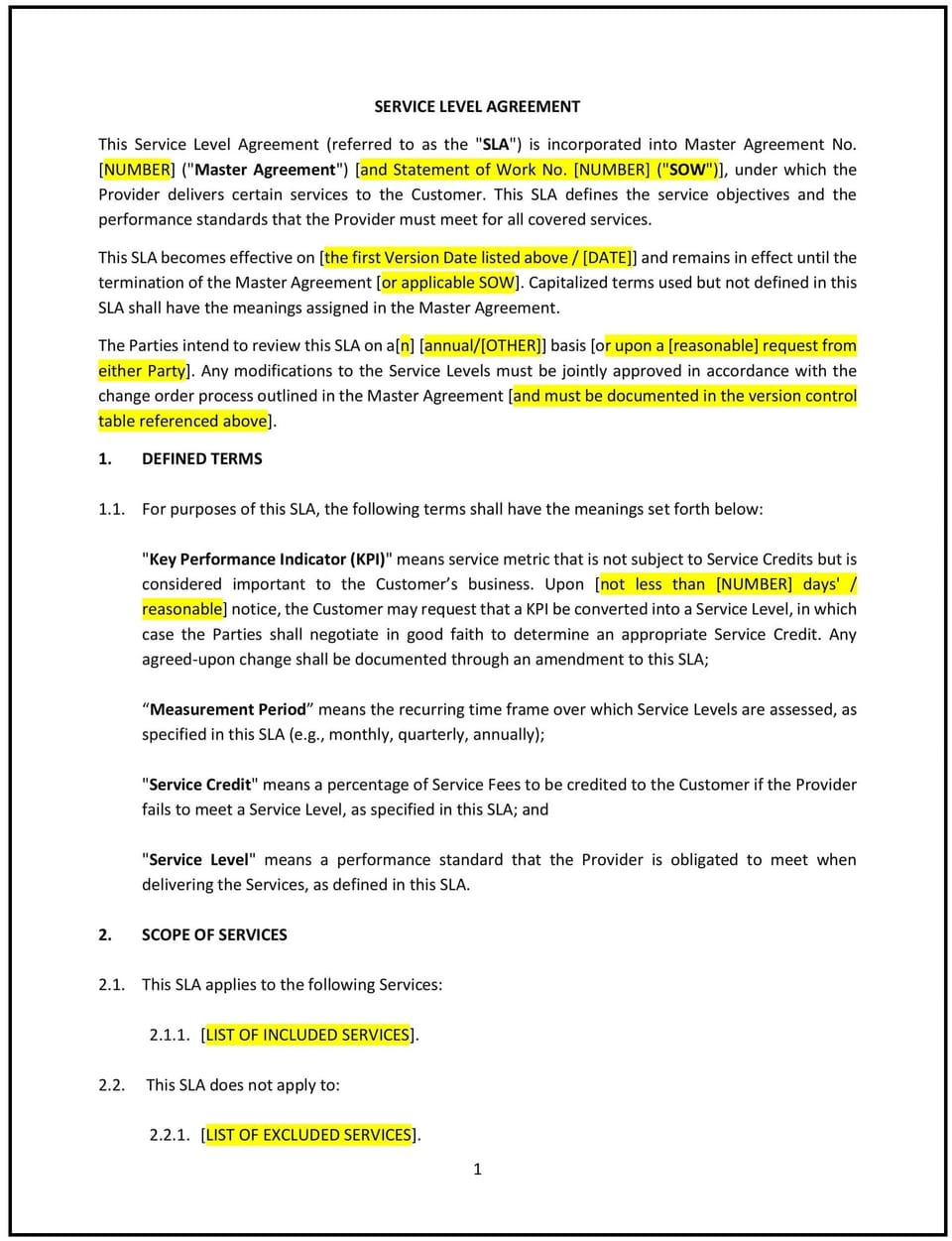Service Level Agreement (SLA) (Ohio): Free template

Service Level Agreement (SLA) (Ohio)
A Service Level Agreement (SLA) in Ohio is a legally binding contract that outlines service expectations, performance standards, and responsibilities between a service provider and a client. It helps businesses ensure that they receive reliable and high-quality services while protecting both parties from potential disputes. SLAs are commonly used in industries such as IT services, cloud computing, consulting, managed services, and maintenance contracts, where consistent performance is crucial.
Ohio contract law governs SLAs, and while there are no state-specific SLA regulations, businesses in industries such as healthcare, financial services, and telecommunications must comply with federal and industry-specific rules. A well-structured SLA can minimize risk, improve service reliability, and provide clear remedies if service expectations are not met.
Tips for drafting and maintaining a Service Level Agreement in Ohio
- Clearly define the scope of services, detailing exactly what the provider is responsible for and specifying any exclusions. This prevents misunderstandings and ensures clarity for both parties.
- Establish measurable performance metrics, such as system uptime guarantees, response times, and resolution deadlines, to hold the service provider accountable.
- Outline client responsibilities, including any access to systems, necessary cooperation, or resource provisions needed to support the service provider’s performance.
- Specify remedies for underperformance, such as service credits, refunds, or termination rights if the provider does not meet agreed-upon service levels. Ohio law allows businesses to negotiate these terms freely.
- Include a dispute resolution process, specifying whether conflicts will be resolved through Ohio courts, arbitration, or mediation. Arbitration is often preferred for cost-effective and timely dispute resolution.
- Address confidentiality and data security, especially if the provider handles sensitive business or customer information. Ohio businesses should also be aware of federal data privacy requirements if handling regulated information.
- Regularly review and update the SLA to reflect technological advancements, evolving business needs, and regulatory changes to keep the agreement relevant and enforceable.
Frequently asked questions (FAQs)
Q: What should Ohio businesses include in a Service Level Agreement?
A: The agreement should specify service scope, performance standards, penalties for non-compliance, client responsibilities, dispute resolution procedures, and contract termination terms.
Q: How does a Service Level Agreement benefit businesses in Ohio?
A: It helps businesses secure reliable service commitments, minimize risks, avoid misunderstandings, and establish structured remedies for service failures.
Q: Are service credits enforceable in Ohio SLAs?
A: Yes, service credits (such as financial compensation or discounts for service failures) are enforceable if clearly stated in the contract.
Q: What happens if a service provider fails to meet SLA requirements in Ohio?
A: Depending on the agreement, the client may be entitled to service credits, refunds, or contract termination. If necessary, legal action may be taken in cases of significant service failures.
Q: How should Ohio businesses handle SLA disputes?
A: The SLA should specify a dispute resolution method, such as mediation, arbitration, or litigation in Ohio courts, to ensure conflicts are handled efficiently.
Q: Are verbal SLAs enforceable in Ohio?
A: While verbal agreements may sometimes be legally binding, a written SLA provides stronger legal protection and ensures that both parties fully understand their obligations.
Q: Can an SLA be modified after signing in Ohio?
A: Yes, but any modifications must be agreed upon by both parties and documented in writing to prevent misunderstandings or future disputes.
This article contains general legal information and does not contain legal advice. Cobrief is not a law firm or a substitute for an attorney or law firm. The law is complex and changes often. For legal advice, please ask a lawyer.


